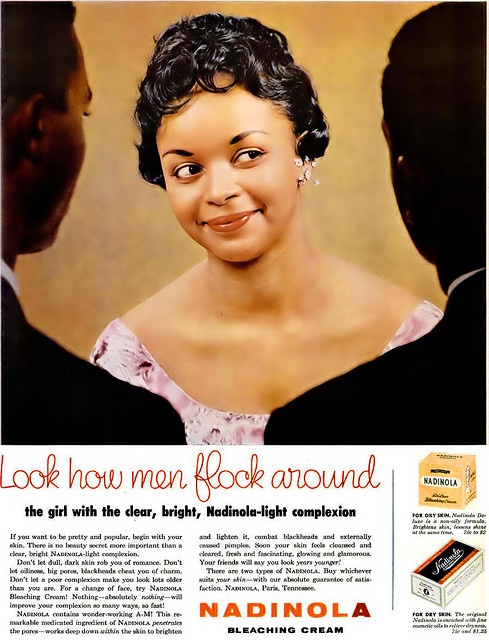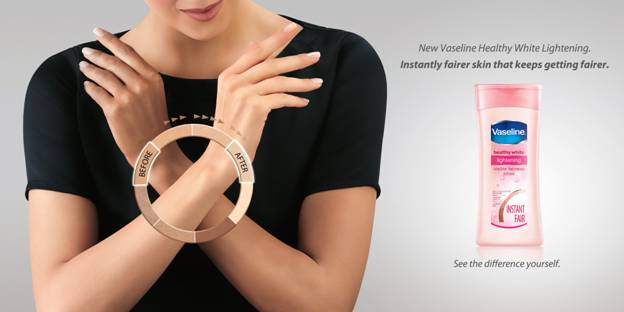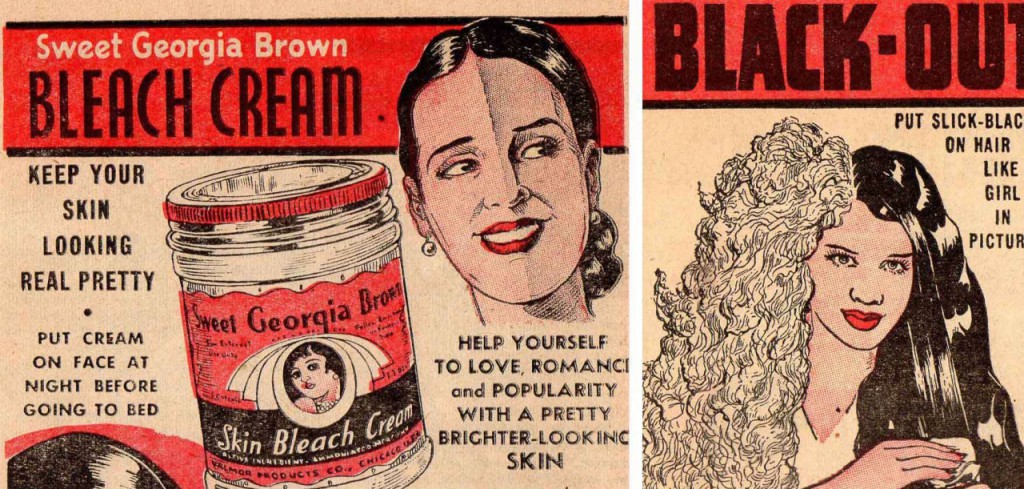
When I was very young I remember asking a friend’s sister if she was ill, because the colour of her complexion had changed so dramatically. Following a number of implausible excuses, she finally admitted that she had been using skin lightener on her face because, “It’s the only way I’m going to get on in this country.” At the time I had no idea what she was referring to – unfortunately, now I do.
Skin lightener has always been available in one form or another, but there has actually been an increase in its usage in the past few years, especially among young black women. Yet people are still loathe to talk about it, let alone admit using it.
These products contain hydroquinone, which inhibits melanin formation. They are legal, provided they contain no more than two per cent hydroquinone, and easily available from chemists, usually in the form of a cream, costing about pounds 3 a tube. But with over-use, they can cause irreversible skin damage and other health problems. So, why do so many young black British women continue to use them?
Elaine, a 22-year-old sales assistant from Manchester, who has been using these creams for more than a year, puts it bluntly. “I use it to be more popular. Everyone knows that in the black community, lighter skin is considered more attractive by a lot of people.” Alison, 20, is a politics student. She doesn’t use skin lighteners herself, but confirms Elaine’s point. “It’s mixed-race girls who get all the attention – this isn’t jealousy, it’s a fact. A lot of black men like light-skinned girlfriends, because white is still seen as successful, and the closer you can be to that ideal, the better. And because a lot of young black men are now pretty reluctant to have relationships outside their own race because of being criticised, they go out with light-skinned or mixed-race girls instead.”
Erica, a 19-year-old student, experienced this first hand. “I went on holiday to Barbados a few years ago with my twin sister, who is lighter than me, and men were always chatting to her, telling her how good-looking she was. They assumed she was a model and complimented her on how pale she was. I was totally ignored. I was really surprised.”
The health risks are well documented, but many women appear to be unaware of them, or are perhaps prepared to ignore them to achieve the “valued” look. Jessica, 24, says she would not even let herself go out into the sun, because she was so terrified of her skin darkening. “I know it seems really silly now, but at the time I was obsessed with being pale. I knew quite a few light-skinned black women who were always popular and successful and never had a shortage of boyfriends. Now I’m left with skin that is patchy and flaky and I don’t think it will ever recover.”

Many women who use skin lighteners believe it has changed their lives – although this could have as much to do with an increase in their confidence as the lightness of their complexion. Sarah, 25, an unemployed graduate, used cream with a dangerously high hydroquinone content of eight percent for more than two years. “At first it was great,” she says. “I was asked out a lot more and was also promoted. But then my skin started to go darker, no matter how much I used it, which, by this stage, was about three times a day. I also began to mix different brands, so it became difficult to apply make-up, because it would slide off my face after a few hours.” But Sarah’s problems didn’t stop there. “Not long ago, I went to have a make-over done and the sales assistant asked me whether I’d ever used skin lightener. I denied it, but she knew, because she said there were tell-tale signs – such as dark and light patches and the texture of my skin was thinner. Now I can’t wear make-up or expose my face to the sun. A dermatologist told me my skin is permanently damaged. My skin won’t absorb anything, not even moisturiser.”

Esther, a 30-year-old student, used skin lightener when she was very young, growing up in a white neighbourhood. “I felt so isolated, I just wanted to look like all my white friends. I straightened my hair and started to use the cream and it wasn’t long before that they began to notice. They seemed to be quite pleased that my skin was getting lighter, I was happy because they always complimented me on my colour, although looking back, I probably looked ridiculous. When I went to college, I started to hang out with other black people and realised I didn’t need to look paler. I also grew out my straightened hair and grew dreads instead.”
Some people think that users of skin lightener only have themselves to blame when things go wrong, because they don’t have a sense of their own identity and are too quick to accept a Westernised look. Women of African Caribbean origin who do something as simple as straightening their hair are especially singled out for criticism. “Many black people still have the slave mentality, you know, we’re the underdog and always will be,” says Jen, 24, an African Studies graduate. “Even during slavery, light- skinned slaves were always played off against the darker ones. Look at all the black stars who have had plastic surgery on their noses and lips to make themselves look more acceptable and won’t even own up to it.”
Sarah adds: “It also doesn’t help that loads of black men are going out with white women. It says to us, you’re no use because you’re black. I know that’s not the only reason, but that’s the message a lot of black women are getting.”
Whether people are prepared to admit it, an unofficial pecking order of lightness does exist. It’s not unknown for black people to ridicule someone darker than themselves. As Yvonne, a 35-year-old teacher, explains: “There are just so many negative connotations associated with being black. I know this is really silly, but even in the film Planet Of The Apes, the light-skinned apes are the cleverest and the blackest are the dumbest.If people feel they can alleviate a lot of the stereotypes of being black by lightening their skin, who am I to argue? After all, not all black people want to be freedom-fighters – they just want to live their lives in peace and keep themselves to themselves.”
Some women are prepared to go to great lengths for this ideal, if not for themselves, then for their children. Michelle, 29, explains: “I want an easy life like everyone else, and if it means people are less likely to judge me solely on the basis of my skin colour because it’s lighter, then that’s fine by me. I have got friends who have purposely got pregnant by white men, so their children are mixed-race, and hopefully have a better start in life, because they’re coffee-coloured. I’d never go that far.”
If racism is the underlying reason why black women want to lighten their skin, are attitudes noticeably changing? The answer seems to be an overwhelming no. “I’m sick and tired of white people telling me that people aren’t as racist as they used to be,” says Sarah. “In some ways, it is just as bad as when my parents first came over, it is just a lot more sophisticated. For example, how many models have you seen wearing their hair in it’s natural state? How many who are dark-skinned, besides Naomi Campbell, are very successful? They all look like coffee-coloured Barbie Dolls and it’s really depressing.” Even Naomi Campbell herself feels pressure sometimes – as she explained in an interview with the Daily Telegraph last week.
Although Diane, a 27-year-old solicitor, believes racism is a factor, she also thinks it’s self-confidence or lack of it which makes all the difference to individual women. “I’m very dark-skinned, but I have never allowed my skin colour to get in the way of anything. I’m not so obsessed with the way I look to be influenced by black or white people’s opinions of me based solely on skin colour.”
Not all black women can cope with the pressures of discrimination. It isn’t surprising that many believe they will make their lives easier by lightening their skin. When I discussed this article with some of my white friends, they were completely perplexed as to the reasons why anyone would do it. After all, I don’t myself. But women who use skin lightener aren’t concerned with the desire to be white. They are concerned with attempting to lessen the effects of racism and sexism in their lives. They use skin lightener to try to gain respect and to be treated as an equal.
© 2019 Dawn Daniels
